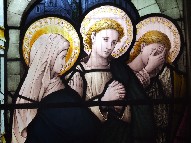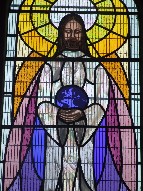| |
|
 |
|
Rickinghall
Inferior, and its neighbour Rickinghall Superior, are names that seem to
have stepped straight out of the pages of
a Thomas Hardy novel. The names mean
'Lower' and 'Upper', of course, not a
distinction which needs to be reached for
in many East Anglian villages. The Rickinghall Superior church is up on the hill
beyond the bypass, mean, moody and
redundant. The Inferior one is down in
the centre of this trim, slightly
suburban village, which stretches for a
couple of miles along the A143, becoming
Botesdale and the parish of Redgrave
before you realise it. Rickinghall Inferior church
is strikingly pretty, like a pretty girl
whose eye you catch in the street; lush
and ornate, it almost seems to flutter
its eyelashes. Partly, this is because of
the delicious topping out of the Norman
tower, turned into a Decorated wedding
cake in the early 14th century. The
strong aisle and long porch accentuate a
sense of voluptuousness, with their
ornate decoration, some of it Victorian.
The gorgeous porch, with its elegantly
arcaded and seated open windows, is the
icing on the cake.
|
Stepping
inside, I was instantly reminded of the interior
of the church at Thelnetham, a couple
of miles off. From the outside, the commonality
is not so obvious, because Thelnetham has a
square tower, but the interior is strikingly
similar, with a wide south aisle, as wide as the
nave, and an ornate piscina set in the south-east
corner of the aisle. Both churches have a most
unusual feature, carved tracery in the east
windows, and it seems reasonable to assume that
the naves, aisles and chancels of both churches
were built by the same masons to the same design,
at roughly the same time, against existing
towers.
Unfortunately, Rickinghall Inferior drew the
short straw when the 19th Century restorations
were being handed out. While Thelnetham's came
under the reasonably safe and steady hand of
Diocesan Architect Richard Phipson, St Mary fell
under the heavy gaze of JC Wyatt, who
unfortunately rather anonymised the interior.
Everything is pretty, but heavily restored. The
reredos is made of medieval panels, but they are
too short to have been a roodscreen dado, and so
may well have originally fronted the rood loft.
They are painted in a medieval style, which is
interesting, and more successful than the fairly
dour 19th century Way of the Cross in the east
window above. More interesting, however, is the
question of where the panels went between the
destruction of the rood loft in the 1540s, and
the construction of the reredos more than 300
years later. Did Wyatt find the rood screen still
in place in the 1850s, or had the panels been
pressed into use for another purpose in the
meantime? Or did they come from another church
altogether?
| Another intriguing detail is
the font. As is familiar from the first
part of the 14th century, it has arcading
carved with window tracery, including an
exact copy of the chancel east window.
However, it was never finished. The
natural conclusion is that the work was
interupted by the Black Death, but it
does suggest that during this period the
fonts were bought uncarved by parishes,
and then the designs were added in situ. There
are a couple of nice panels of Flemish
glass, probably 18th Century, which
appear to depict the disciples at the
Last Supper. As in many Suffolk churches,
the millennium project here was a stained
glass window, an image of Christ the
Saviour of the World, placed in the east
window of the aisle, and signed Eckersley
in a snail. Having moaned about the glass
in the chancel east window, I was pleased
that this one was like a breath of fresh
air, but I can't honestly say that I
thought it was particularly exciting.
There does seem to have been a loss of
nerve in the design of stained glass in
recent years, perhaps the fault of those
commissioning it. Dramatic abstract forms
seem to have been replaced by
increasingly safe naive figurative art,
and although the window at Rickinghall
Inferior doesn't stoop to a secular
subject like some, it doesn't fire the
imagination as, for example, Surinder
Warboy's treatment of the same subject at
Chillesford
does. Still, local people that I spoke to
seemed to like it.
|
|
 |
|
|
|

